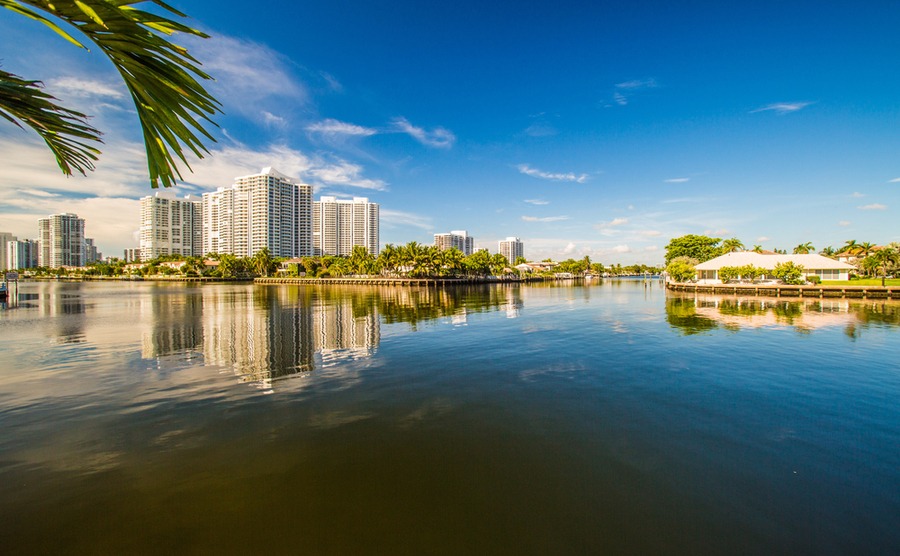With its year-round sun, theme parks, beaches and other attractions, Florida is a tourist hotspot, no matter the season. No wonder that so many choose to rent out their property while they’re not there! However. you’ll need to make sure it’s properly set up. This week, we’re looking at your options for property management in Florida.
Find homes in the USA via our property portal.
Can you rent out your property?
The majority of British people who buy property in the USA purchase holiday homes in Florida. Many buy with the intention of using the property as an ideal holiday spot for them to enjoy with family and friends. Why not make a little money, however, when the home is being left empty?
If this is your plan – like the Bacons whom we recently interviewed – then you need to make sure that your property meets the right criteria and that you have the correct licenses in place. Here are your options for property management in Florida.
Short-term rental (STR) property management in Florida
If you plan on letting your property to holidaymakers, before buying anything, you need to make sure that the property is located in a short-term rental zone. There are restrictions on where these are located and limits on how long you can rent the property for.

Follow our tips to get your property management in Florida sorted.
The majority of Florida’s STR zones are close to the theme parks and attractions and you can let them out to visitors for any period up to seven months. One major difference between an STR and a LTR is that STR owners must pay the State’s hotel tax on all rental agreements under seven months. Before committing to anything, speak to your realtor about whether the area and property you’ve chosen fits in with your plans.
Long-term rental (LTR) property management in Florida
If you are using the property as a rental investment and don’t plan on using it yourself, you may decide to buy something in a residential zone. Provided you have the approval of the local community association, you will be able to rent your property as an LTR for seven months or more. Be aware that communities can be “deed restricted”, which means they forbid long-term rentals. Your realtor will be able to advise on this.
Licenses
To rent out a property you need to follow local laws, which state what licenses you are required to hold. These will include hotel/ motel lodging licenses, a tourism tax license and a business license, which allows you to operate your property as a hotel.
Community approval
Even if within an STR zone, it doesn’t mean your property is approved by the Home Owners Association (HOA) of that zone.
Check that your community allows for properties to be used for short-term rentals.
Property management
Maintaining a second home, especially if you rent it out, is not easy when it’s a ninehour flight away. This is why employing an efficient, trustworthy property manager is one of the most important considerations for those aiming for rental income.
Property management services include: Key-holding – This can be useful whether or not you decide to rent out the property – for example, if there were a domestic emergency and someone needed to enter your house in your absence.
Pool maintenance – Ideally, this should be carried out each week, including cleaning the filters, testing the water’s chemical levels and cleaning the patio.
Garden maintenance – Lawns will need regular mowing, especially in summer, and borders and pathways will need weeding – appearance is especially important for rentals.
Bills and accounting – Your property will come with ongoing bills; your management company should take care of them for you.
Cleaning – This includes preparing everything for rental guests (and your own visits), and inspections during changeovers.
Rental bookings – You can secure bookings yourself by listing your property online or instruct your management company to fill the weeks for you.
Pest control – This is a must for the interior and exterior of your Florida property. It should be carried out by a licensed pest controller.
Enjoy the good times, but insure against the bad
It’s a fact of life that accidents, natural disasters and thefts happen all over the world. Parts of the USA are prone to hurricanes, flooding and earthquakes.
Of course, you can minimise the risk of exposing yourself to such unfortunate instances by researching where to buy your property. However, there is no substitute for having your property and its contents fully insured in the unlikely event that the worst does happen.
The contents of an insurance policy, cost and eligibility requirements for insurance differ from country to country, and depending on the insurer itself. This is why it is a good idea to use a reputable international insurance company that can provide you with a comprehensively tailored policy to meet your needs.

A crucial part of property management in Florida is to make sure you’re insured against any eventualities.
If you are buying your USA property as a second home that you intend to let out, you must ensure that your insurance policy accommodates this. If your US property will not be your primary residence, you should consider using a UK-based insurance company that specialises in holiday homes.
This way, you can pay for your policy in pounds and by direct debit, plus your liability limits may be higher. The insurer will be able to provide a specialist policy intended for holiday homes and some have a 24-hour helpline offering assistance in the case of domestic emergencies.
If you are buying your USA property as a second home that you intend to let out, you must ensure that your insurance policy accommodates this.
If buying in Florida, you’ll find that standard insurance policies covering you for most eventualities are inexpensive. Your property management company will also be in charge of taking a security deposit from each group of guests to cover any accidental breakages.
Know your healthcare options
It’s of the utmost importance that you consider your health when you move to the USA, or are spending extended periods of time there. Make sure that you know where your nearest medical centre and hospitals are, and what to do in the case of an emergency. If you require regular treatment or medication, you need to know for certain that you will be able to access it in the USA.
As there is no free healthcare system in the USA, obtaining insurance that covers your healthcare is absolutely critical, or else you could end up paying out a small fortune if you fall ill or have an accident.
If you reside permanently in the US, there are a number of expat policies available. If you are only planning on staying in the US for part of the year, it makes sense to arrange an insurance policy in the UK.
And, if you’re living overseas, make sure you fit all legal requirements, both in terms of the purchase and any income you make. Use our enquiry form below if you’d like to be given introductions to recommended lawyers for free.










